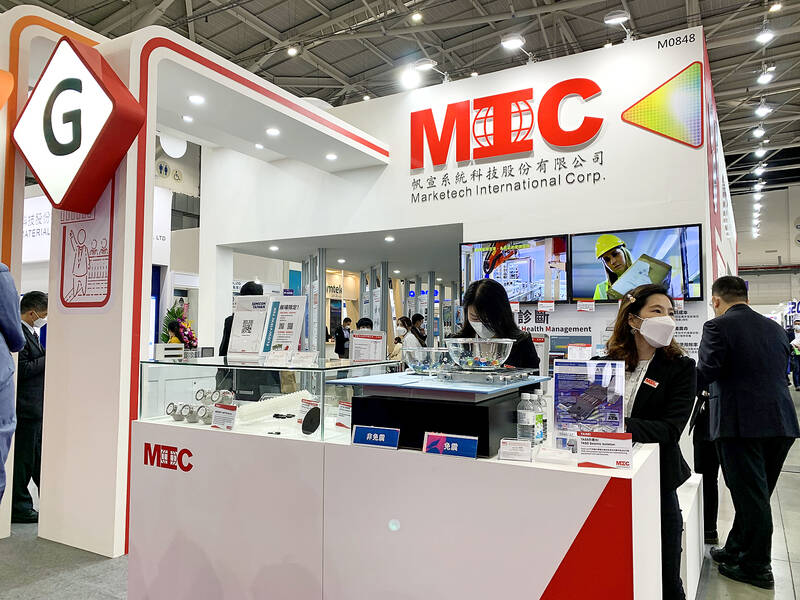Marketech International Corp (帆宣), a semiconductor and display panel equipment supplier and distributor, yesterday said it is to launch a subsidiary in Dresden, Germany, as its major customer, Taiwan Semiconductor Manufacturing Co (TSMC, 台積電) last month announced it is building its first European fab in the area.
TSMC is constructing a 12-inch wafer fab in Dresden to produce mainly car chips. The world’s largest contract chipmaker plans to build three advanced fabs in Arizona and two in Kumamoto, Japan.
Marketech has set up US and Japan subsidiaries to provide services to TSMC in those countries. It also set up an office in the Czech Republic last year to collect information about the local investment environment.

Photo: Grace Hung, Taipei Time
Marketech plans to hire about 125 employees in Europe — about half the size of its US subsidiary, company president Scott Lin (林育業) said yesterday.
The US subsidiary remains in the red due to higher labor costs, he said.
The company has slowed down the construction of a new factory in Tainan due to weaker-than-expected demand from display panel customers, he said.
Lin added that the company expects the NT$1.9 billion (US$59.2 million) Tainan factory would become operational in the second quarter of next year.
Marketech’s revenue in the first seven months of the year grew 10.42 percent annually to NT$34.92 billion.
The company expects revenue and net profit to show moderate growth in the second half of the year, Lin said.
However, the company projects more marked growth in revenue and profit next year, given an expected more solid recovery in the semiconductor industry and the contribution of the new product lineup, he said.
Marketech is planning to tap into the advanced packaging industry by supplying chip-on-wafer-on-substrate (CoWoS) equipment, he said.
It is collaborating with a Japanese company to offer CoWoS equipment from next year, he added.

ELECTRONICS BOOST: A predicted surge in exports would likely be driven by ICT products, exports of which have soared 84.7 percent from a year earlier, DBS said DBS Bank Ltd (星展銀行) yesterday raised its GDP growth forecast for Taiwan this year to 4 percent from 3 percent, citing robust demand for artificial intelligence (AI)-related exports and accelerated shipment activity, which are expected to offset potential headwinds from US tariffs. “Our GDP growth forecast for 2025 is revised up to 4 percent from 3 percent to reflect front-loaded exports and strong AI demand,” Singapore-based DBS senior economist Ma Tieying (馬鐵英) said in an online briefing. Taiwan’s second-quarter performance beat expectations, with GDP growth likely surpassing 5 percent, driven by a 34.1 percent year-on-year increase in exports, Ma said, citing government

‘REMARKABLE SHOWING’: The economy likely grew 5 percent in the first half of the year, although it would likely taper off significantly, TIER economist Gordon Sun said The Taiwan Institute of Economic Research (TIER) yesterday raised Taiwan’s GDP growth forecast for this year to 3.02 percent, citing robust export-driven expansion in the first half that is likely to give way to a notable slowdown later in the year as the front-loading of global shipments fades. The revised projection marks an upward adjustment of 0.11 percentage points from April’s estimate, driven by a surge in exports and corporate inventory buildup ahead of possible US tariff hikes, TIER economist Gordon Sun (孫明德) told a news conference in Taipei. Taiwan’s economy likely grew more than 5 percent in the first six months

SMART MANUFACTURING: The company aims to have its production close to the market end, but attracting investment is still a challenge, the firm’s president said Delta Electronics Inc (台達電) yesterday said its long-term global production plan would stay unchanged amid geopolitical and tariff policy uncertainties, citing its diversified global deployment. With operations in Taiwan, Thailand, China, India, Europe and the US, Delta follows a “produce at the market end” strategy and bases its production on customer demand, with major site plans unchanged, Delta president Simon Chang (張訓海) said on the sidelines of a company event yesterday. Thailand would remain Delta’s second headquarters, as stated in its first-quarter earnings conference, with its plant there adopting a full smart manufacturing system, Chang said. Thailand is the firm’s second-largest overseas

Taiwan Semiconductor Manufacturing Co’s (TSMC, 台積電) market value closed above US$1 trillion for the first time in Taipei last week, with a raised sales forecast driven by robust artificial intelligence (AI) demand. TSMC saw its Taiwanese shares climb to a record high on Friday, a near 50 percent rise from an April low. That has made it the first Asian stock worth more than US$1 trillion, since PetroChina Co (中國石油天然氣) briefly reached the milestone in 2007. As investors turned calm after their aggressive buying on Friday, amid optimism over the chipmaker’s business outlook, TSMC lost 0.43 percent to close at NT$1,150